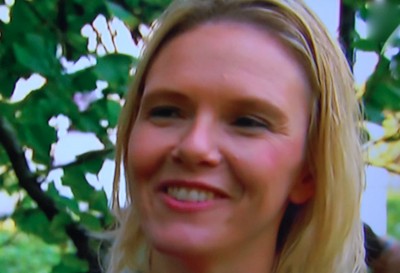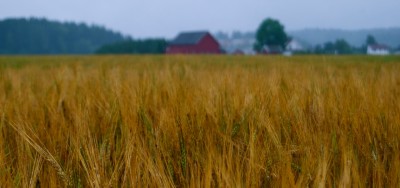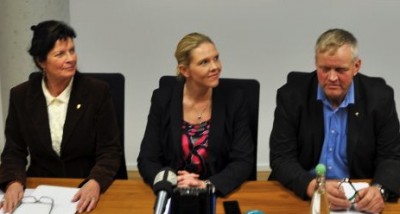NEWS ANALYSIS: She’s been called the Norwegian farmers’ worst nightmare, but also a ray of hope for consumers weary of Norway’s notoriously high food prices and protectionism. Sylvi Listhaug, Norway’s new Minister of Agriculture and Food, has kept smiling through the storm of the past week, intent on modernizing Norwegian agriculture for as long as she manages to hang on to her post.

If there’s one minister worth watching by those looking for the change that may be ushered in with the new government in Norway, it’s Listhaug. Rarely has a newly named government official stirred up so much fuss, even before doing anything, as Listhaug from the conservative Progress Party (Fremskrittspartiet, Frp).
She’s been attacked on a variety of fronts, from making a comment several years ago that likened Norway’s agricultural politics to communism, to her initial refusal to divulge who her clients were at the controversial public relations firm First House, often accused of influence peddling. She most recently was on the firm’s high-profile and highly paid staff of former top politicians, after having been a high-ranking official in Oslo’s city government. First House has since delivered a list of her clients to the legal experts in her ministry, which opposition politicians politicians in Parliament are clamouring to see as well.
Now, after her short career in public relations and lobbying, she’s going to be in charge of agricultural and food policies in Norway. Her penchant for market liberalism has the farmers, who depend on strict market regulation and state subsidies, seriously worried. Her appointment as agriculture minister was one of the big surprises when Conservative Prime Minister Erna Solberg announced her cabinet last week. It didn’t take long for the farmers, already unhappy and feeling threatened by the change of government, to react.

“Out among the farmers there’s no doubt that the choice of Listhaug creates unease,” Nils T Bjørke, leader of the farmers’ powerful national lobbying group Norges Bondelaget, told state broadcaster NRK. Merete Furuberg, leader of the other major farmers’ group Norsk Bonde- og småbrukarlag, said that not everything the farmers were saying about Listhaug was suitable for publication.
“I’m provoked and so are my neighbours,” Bjarne Undheim, a farmer from Jæren and former head of the farmers’ lobby, told NRK after Listhaug’s appointment was first reported. He fears that “Listhaug will tear down the pillars of agriculture,” like its high tariff protection against cheaper imported food products and its state subsidies. “No one is so dependent on functioning tariff protection as the largest (food) producers,” Undheim told NRK.
‘Setting the farmers free’
That’s exactly what Listhaug wants to change, and she seems surprised that the farmers themselves so desperately want to cling to their long-held tariff and subsidy systems, which regulate production and prices, which help keep the latter high. Recent figures from the OECD showed that Norway ranks highest in the world in state support for agriculture, beating out even Japan and Switzerland, with an average of 63 percent of farmers’ pay now tied to subsidy and protectionism. She thinks the farmers should strive to be less dependent on the state, with her party long advocating that “it’s time for new medicine where we set the farmers free to produce what they want and as much as they want.”
Her own party’s program calls for eventual removal of Norway’s high protective tariffs against imports. It also calls for new free trade agreements, zero tariffs on products from all developing countries, deregulation of agricultural land and removal of market regulations and price-setting, among other things. Listhaug has promised she will follow the coalition government’s approved platform between Frp and the Conservatives (Høyre), but both parties favour agricultural reforms, and the two parties together won the most voter support at last month’s parliamentary election.

On Tuesday Listhaug sat down with both Bjørke and Furuberg, to clear the air but also formally signal that she wants to “modernize” Norwegian agriculture through various reforms. She said she wants “good dialogue” with the farmers but that she intended to quickly tackle the current price regulation of agricultural land, arguing that it was “unreasonable” that other businesses can freely sell their real estate on the open market, while farmers are subject to restrictions. The farmers themselves have clung to those restrictions, though, to keep farmland within families and affordable.
While farmers have a reputation for being combative, resistant to change and rarely satisfied with their state support, Listhaug wants them to be more optimistic and market -oriented. While Norwegians themselves are generally passive about paying the world’s prices for food, even some of them are joining visitors and newcomers to Norway in reacting to more recent increases in the prices of meat and dairy products. It’s not uncommon to see lamb roasts, for example, priced at around NOK 400 (nearly USD 70) in the markets these days, even in the middle of the season. A dozen eggs ranges from NOK 37 to NOK 45 or more (USD 6-7.50), depending on the grocery store, which the farmers in turn blame for Norway’s high prices. Many of Listhaug’s critics want to know whether she worked for any of the big grocery store chains while in the PR business, suggesting possible conflicts of interest.
Sympathy and support
Farmers have long historical traditions in Norway and many Norwegians remain sympathetic to the farmers’ demands, wanting to retain the country’s rural, pre-industrial roots and, not least, the country’s so-called “cultural landscape.” Listhaug grew up on a farm near Ålesund herself, and says she’s “proud of my roots from the farm,” but is prepared to give up her right to inherit it for the sake of the reforms she thinks are important. The farmers will have trouble bashing her background, but some, including the former agriculture minister Lars Peder Brekk from the farmer-friendly Center Party, have already said they hope her family will “hold her by the ear” as she exerts her government power.
Professor Reidar Almås told newspaper Dagsavisen last week that Listhaug faces tough opposition in Parliament but may get the support she needs from the Liberal Party (Venstre), which largely agrees with the government’s platform and already has urged a reversal of last year’s controversial hike in tariffs on meat and cheese. He hopes the farmers “don’t try to bully her out of office,” like has happened with other ministers who try to introduce reforms that threaten vested interests.
Bjørke and Furuberg called their meeting with Listhaug “useful” when it was over, and claimed they were glad to get a chance to talk with her less than a week after her appointment. “Even though she wants to make changes that can weaken agriculture, she said the goal of having the highest level of self-sufficiency possible remains firm,” Bjørke stated on his own organization’s website.
Listhaug’s office, meanwhile, acknowledged that a lot of “clear skepticism” remains on the part of the farmers. A new meeting is expected in December.
newsinenglish.no/Nina Berglund

